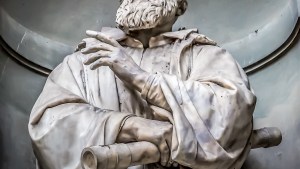Lenten Campaign 2025
This content is free of charge, as are all our articles.
Support us with a donation that is tax-deductible and enable us to continue to reach millions of readers.
Not all bad things do harm. In the history of the Church, heresies themselves helped strengthen the faith.
Heretical movements raise doubts and alternative interpretations of Catholic doctrine. While they may create attrition and division, they also help the Church to better articulate the truth and more deeply understand what she believes.
One of the most notable heresies was Arianism in the 4th century. This heresy denies Jesus’ divine nature, making Jesus nothing but a creature, although an extraordinary one.
Then in 325, it was the Council of Nicea that said that the Son is “begotten, not made, consubstantial with the Father.” The dogma of consubstantiality is one of the keystones of what is called precisely the “Nicene” Creed, which we recite today.
Nestorius, a patriarch of Constantinople in the 5th century, tried to combat a heresy but became a heretic himself: He denied the Virgin Mary the title of Mother of God, and denied that Christ the man coincided with the Word begotten of the Father.
That doctrine was condemned by the Council of Ephesus in 431, which established the dogma of the divine maternity of Mary, attributing to her the title of “Mother of God.”
Those who spread heretical doctrines attack the unity of the faith, and are punished with excommunication. In the past, the repression of heresies reached the point of literal crusades.
Such is the case of the Cathars, whose doctrine spread from the 12th to the 14th centuries in southern France and northern Italy. The Cathars believed in two principles, Good and Evil, rejected the sacraments, and scorned the body. They also believed that Jesus was only an angel with the appearance of a man. The heresy was condemned by various local councils and by the 3rd Lateran Council, and then, in 1208, the pope called for an authentic crusade: a 20-year war with vast bloodshed, a genocide in the opinion of many historians.
In those same years, St. Dominic de Guzmán, who was committed to preaching against the Cathar heresy, founded the Dominican order.
The Virgin Mary herself is said to have appeared to him indicating that the Rosary was the most effective prayer for combatting the heresy without violence.
St. Anthony of Padua also preached against the Cathar heresy, to the point of being called the “hammer of heretics.”
Another great defender of the faith against heretics was St. Augustine. He himself came to the faith after a tormented journey of doubts and research. He preached and wrote against the Manicheans, Donatists and Pelagians.
In doing this, he gifted to the entire Church his deep theological thought, such that he is among the Doctors of the Church.
Predestination and the denial of free will: Jansenism developed in the 17th and 18th centuries and was condemned repeatedly by the Church.
However, the Catholic response to that heresy came above all through the development of the devotion to the Sacred Heart of Jesus, which drew attention to God’s mercy.
Finally, Modernism is among the most recent heresies.
It’s an attempt to adapt the faith to the rationalistic spirit of the times, and even today its influence is felt in the relegation of the faith to a certain sentimentalism and intimism.
In his encyclical condemning it, Pope Pius X speaks of a “synthesis of all heresies” among the most dangerous ones in the history of the Church.
Many other heresies and false Christian doctrines have followed one another over the centuries.
For us as believers, the Catechism can be a solid resource for deepening our knowledge of the faith and protecting us from possible doctrinal errors.


